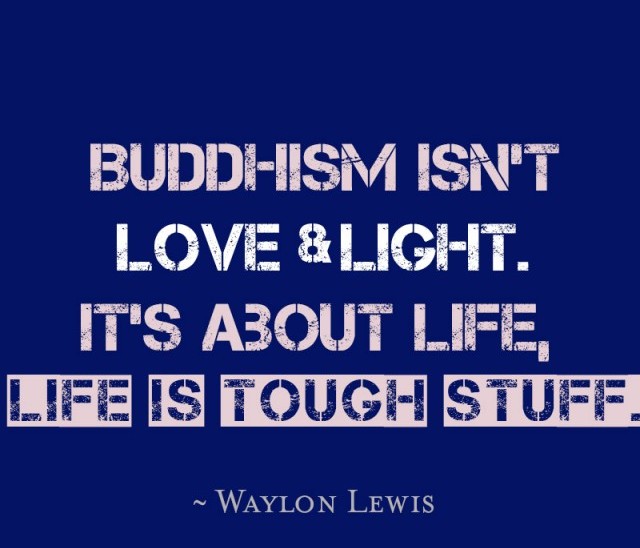
I had more than a few misconceptions about Buddhism when I first started practicing.
I was pretty harsh with myself. I meditated every day, stopped eating meat and refrained from buying more stuff. I almost wore a red robe and shaved my head.
It wasn’t long before I realized that Buddhism wasn’t about remaining seated in meditation or becoming a vegetarian. And unlike what the majority believes, it’s not only about peace and love.
Two years ago, Dzongsar Jamyang Khyentse helped me understand what it truly takes to be a “Practicing Buddhist.” I realized that I didn’t have to be born in a Buddhist country or shave my head and wear robes to become one. I could still live a normal life in the west and be a Buddhist.
So what makes someone a Buddhist?
According to Khyentse, only if you can answer these four questions with an unequivocal “yes”, can you consider yourself a Buddhist:
- Can you accept that all things are impermanent?
- Can you accept that all emotions bring pain and suffering?
- Can you accept that all phenomena are illusory and empty?
- Can you accept that enlightenment is beyond any concepts?
Khyentse ascertains that we are not Buddhists if we believe that any substance is permanent.
We are not Buddhists if we believe that emotions are purely pleasurable and bring us gratification.
We are not Buddhists if we believe that certain things—including ourselves—exist in the sphere of space and time.
We are not Buddhists if we believe that enlightenment is power, blissful heaven or a release from delusion.
Buddhism revolves around these four concepts. Khyentse says that while we don’t have to be constantly and endlessly mindful of them, they must reside in our minds and become just as familiar to us as our own name.
It was quite hard for me to grasp these truths on a deeper level, particularly since we’ve been accustomed to thinking that things are permanent, pleasurable and part of a coherent existence. With time, I realized that these concepts were true and putting them into practice has brought about an abundance of benefits into my life.
This is how I do Buddhism:
- No matter what I’m doing, in the back of my head resides the thought of impermanence. Remembering that everything is passing and disintegrating helps me appreciate my present moment, and the good and bad situations and people in my life. I no longer take things as seriously as before, instead I choose to live fully.
2. In the past, I thought that emotions were meant to bring me pleasure, so I held onto them. With further examination, I came to notice that with every pleasurable feeling ultimately came suffering—like a package I couldn’t help but receive. Today, I don’t cling to emotions in order to save myself the heartache. I realize that emotions arise from particular causes and conditions that are passing, so I no longer buy into them.
3. I look at everything today in a different manner. When I see people, situations, materials and life itself as an illusion, I free myself from disappointment. I enjoy my experiences, but I know at the same time that they don’t really exist—I perceive them as dreams.
4. I tried for years to delineate Nirvana. Khyentse helped me realize that it was impossible to put that state of being into words. Now I know that enlightenment is not happiness, nor unhappiness. Enlightenment is simply peace; and I can attain it through courage, willingness and diligence.
Author: Elyane Youssef
Editor: Nicole Cameron
Image: elephant journal original


 Share on bsky
Share on bsky




Read 12 comments and reply